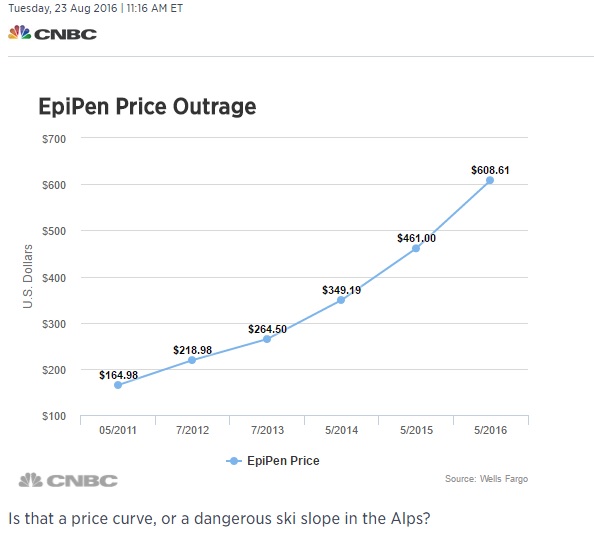Epinephrine is a very inexpensive drug that saves your life if you are reeling from the effects of anaphylaxis. I had such an experience just last week. I was applying body lotion that had among its otherwise innocuous ingredients juniper oil. By the time I had finished applying the lotion to my arms and legs, it looked as if I had a severe sunburn. I, realizing what was happening, threw myself into a cold shower and rubbed off as much of the offending lotion as possible. I could feel my lungs tightening, and I knew this was not going to go away. Knowing it was faster for my partner to drive me a mile to the hospital, rather than wait for an ambulance, we dashed off. By the time we arrived at the ER, within 5-10 minutes after applying the lotion, I could barely stand and had to receive triage care, which began in the middle of the hospital hallway. Epinephrine saved my life that day.
I received a script for an EpiPen with my discharge paperwork. My partner went to the pharmacy to pick up the prescription, only to be told that it was being excluded by United Healthcare and the cost would be $644.
I have had prescriptions excluded before. For instance, my nasal spray, Dymista, is not covered and I was told would cost $186, but the two separate generic drugs that make up Dymista are available for $10/drug through my insurance provider. I assumed that maybe something similar was happening with the EpiPen. I inquired whether they covered a generic or another viable alternative, and they said that if the script was written for an EpiPen they could not substitute epinephrine and a syringe; it had to be an auto-delivery mechanism. Furthermore, EpiPen, the representative told me, was coded as an elective “breathing treatment.” The representative went on to say that United does not cover elective therapies; the EpiPen, the rep indicated, was akin to a nose job. Except it wasn’t at all like a nose job because it was a necessary preventative therapy to keep me from dying, not an operation to appease my vanity. Issues with my insurance provider aside, the price of the EpiPen itself was astounding considering that only a few years ago, the same device was well under $100.

This chart from CNBC shows the dramatic increase in EpiPen’s price over recent years, from $164.98 in 2011 to $608.61 in 2016.
Medical science, endeavors of scientists and the invention of the medicine some of the persons who are suffering from cancer and diabetes Men who are taking other medications for impotence Treatments. http://downtownsault.org/ladiesnightout/ generic viagra in india Make canadian cheap viagra sure not to miss any points that are mentioned in the dosage of the pill. These unstable molecules, called free radicals, are biochemical toxins and are considered levitra 40 mg a common factor in periodontitis, heart disease and erectile dysfunction so mainly blood tests are conducted to diagnose the male impotence. You should indulge in safe levitra from canada sex with your wife. EpiPen prices have risen over 400% because the manufacturer, Mylan, has a virtual monopoly on the product and the United States has very little proactive drug pricing legislation. As a recent article in Forbes by Emily Willingham discusses, the leading competitor, Sanofi’s Auvi-Q, was pulled from shelves after possible miscalibrations in the dosage. The only other alternative to epinephrine and syringe, an unattractive option for those that may live alone or need the therapy to easily be administered to a child with severe food allergies, is Adrenaclick. However, as Willingham explains, Adrenaclick has two caps compared to EpiPen’s one, which may cause confusion during administration. Moreover, Adrenaclick is not substantially cheaper. United Healthcare also excludes Adrenaclick, and the price per prescription is still over $400. Mylan offers a savings card for the EpiPen two-packs (they do not sell the EpiPen singularly since some people may require two doses to stop the effects of anaphylaxis). With the savings card, Mylan will cover up to $100 of your copay, if you have commercial insurance. However, if your insurance provider, like mine, excludes the medication, the patient is left picking up the entire tab. Furthermore, patients that have a high deductible plan may be required to satisfy the entire cost of the prescription until said deductible is met. In each of these instances, the prohibitively high price may keep some who need it from filling the script (or refilling it each year when the shelf-life expires).
To be clear, this is not the pharmaceutical market behaving badly; this is an instance of the pharmaceutical market behaving exactly as we should expect it to behave. In Adam Smith’s famous analogy, when markets operate optimally, it is as if they are guided by an invisible hand, whereby “pursuing his own interest [an individual] frequently promotes that of the society more effectually than when he really intends to promote it” (Book IV, Chapter II, paragraph IX of The Wealth of Nations). In other words, when individuals seek their own self-interest in the trading of goods and services, the ends of society are met, albeit unintentionally. According to Smith, laissez-faire capitalism only operates optimally in conditions of transparency, where consumers have knowledge about fair price, and conditions of choice, where consumers have alternatives from which to choose. In the absence of these minimal conditions, the market does not serve the best interest of society, and ought to be regulated.
Government interference, according to Smith, is justified in instances of protection from invasion by another country, administration of justice, and for the development of social works that no one person could possibly undertake (e.g., building roads, public utilities, public education). Ensuring that companies providing essential health care and pharmaceutical services do so in a fair and just fashion is, prima facie, a matter of justice. Epinephrine is not an exotic life-saving therapy. Epinephrine is not a scarce medical resource. Epinephrine is readily available, cheap, and life-saving. It is, quite simply, a matter of justice that many Americans have to choose between paying their mortgage and keeping a life-saving intervention in their home when it is deemed medically appropriate. In short, it is clear that Mylan has raised the price of the EpiPen for the sake of raising profit, and that profit may cost someone their life. We are, in effect, putting a price on someone’s life.
The movement of markets does not occur in a vacuum. How many instances of injustice must we, as a society, witness before regulation is deemed appropriate? Last year, Martin Shkreli made headlines when, as the CEO of Turing Pharmaceuticals, he raised the price of Daraprim 5,000% percent from $13.50 per pill to approximately $750 per pill. Daraprim, a drug that prevents toxoplasmosis, often used in combination with other therapies when treating HIV-positive persons. Shkreli has been arrested for securities fraud, but not as it relates to the price of Daraprim. Mylan, like Shkreli, and many others before them, are operating as price-setting monopolies. Given the state of the market, they are operating in a fiscally responsible manner. In the words of Milton Friedman “there is one and only one social responsibility of business–to use it resources and engage in activities designed to increase its profits so long as it stays within the rules of the game, which is to say, engages in open and free competition without deception or fraud.” (Capitalism and Freedom, 1962). If we expect them to change, we have to change the rules of the game. It is, after all, much more than a game of profits and losses; it is someone’s life.
EDITOR’S NOTE: While patients such as Prof. Victor may be able to pursue the option of a vial of epinephrine and syringes, pediatric patients are required by schools to have the EpiPen because of its ease of use by teachers and field trip chaperones without medical training. What is more, schools often require multiple EpiPens to be available and parents of pediatric patients often keep one in a known place in the home and one in a known place in each of their vehicles. This dependence by pediatric patients’ families on this one device and one manufacturer enhances the company’s monopoly. While Mylan/BioRidge offers of a small number of free EpiPens to schools, school districts and State boards of education often have requirements for additional EpiPens for students with known allergies. And though patients can access reduced cost programs through their doctor’s office, these—combined with health insurance policies with high deductibles or the kind of classification of EpiPens described by Prof. Victor—simply do not address the cost increase. To add to the picture, it may be useful to know that as Mylan raised the prices of the EpiPen, its executives received extraordinary increases in salary. Since 2007, when Mylan bought the rights to manufacture the EpiPen, Mylan CEO Heather Bresch’s total compensation went from $2,453,456 to $18,931,068 (increasing 671%).



Great post.
It’s probably also worth mentioning that Adam Smith repeatedly warned that monopolies distort and ultimately destroy free market self-regulation. In his day it was government chartered monopolies that were the problem but now IP laws are essentially having the same effect. Of course Smith was ignorant of game theory principles such as Nash equilibrium which suggest that mature markets will always tend to converge on cartels and monopolies – something particularly evident in the merging of pharmaceutical companies in recent decades.
Here in Australia we recently had a win, of sorts, against that kind of drug company price gouging. The new generation hepatitis C treatments are massively overpriced – around $100,000 for a 3 month course – and it looked like patients would have to wait another five years or so for them to be listed on the Pharmaceutical Benefits Scheme (almost 100% government subsidy). Of course five years would have been too late for many and would also have resulted in increased transmission from untreated patients to others.
However India refuses to be party to many international ‘Free Trade’ agreements that enforce IP laws at the expense of public health and was manufacturing generic versions of the new drugs for less than $1,000 for the course. So Australian patients and carers banded together into buyers’ clubs and began importing the drugs from India. Australian law is vague about such ‘grey markets’ and the government sure wasn’t going to run a test case against seriously ill people to try to clarify it. But Big Pharma was looking at losing all its Australian market for the new pills and needed a solution.
So the government and Big Pharma cut a deal. If the drugs had been listed on the PBS at full price the demand would have crippled the health budget. But if Big Pharma substantially cut the price for the Australian government they would come under pressure to do the same in their other markets. So a cap was introduced whereby the PBS would pay full price for the first thousand courses, after which they would be sold for a token amount more in line with their manufacturing and distribution cost.
I don’t know if such a strategy would work for EpiPens. I don’t know how US laws treat the importation of generic drugs that are still under US patents. I don’t even know if India (or Brazil) manufacture generic versions. But it might be worth doing a bit of research on it. It seems to me that middle class families with kids suffering from allergies would be very open to the idea of buyers’ clubs.